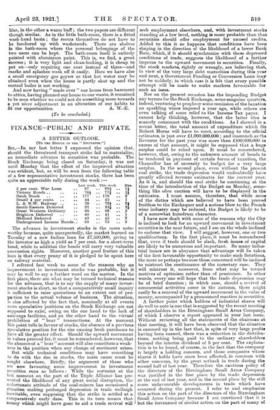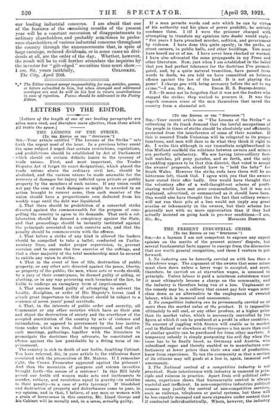FINANCE—PUBLIC AND PRIVATE.
A BETTER OUTLOOK.
[To THE EDITOR OF THE " SPECTATOR."] SIR,—In my last letter I expressed the opinion that, should the threatened transport strike fail to materialize, an immediate advance in securities was probable. The Stock Exchange being closed on Saturday, it was not until Monday that the effect of the improved situation was evident, but, as will be seen from the following table of a few representative investment- stocks, there has been quite an appreciable rally during the week :— 5 per cent. War. Loan Victory Bonds ..
Last week.
87 ..
761 .. This week.
881
771 • •
Else. 1
1
1
Bank Stock .. 177 .. 179 • • 2 Brazil 4 per cents. .. .. 44 .. 45 . . 1 L. & N.W. Railway .. 70 .. 721 • •
South-Eastern Deferred .. 21 .. 23} • •
2
Great Western Ordinary .. 66 .. 69 • • 3 Brighton Deferred .. 40 .. 41 .• 1 Midland Deferred .. .. 43 .. 45 .. 2 Underground Income Bonds.. 69 .. 72 • . 3
The advance in investment stocks is the more note- worthy because, quite unexpectedly, the market learned on Tuesday of a new Indian loan for £7,500,000, giving to the investor as high a yield as 7 per cent. for a short-term bond, while in addition the bonds will carry very valuable conversion rights. Moreover, another good feature of this loan is that every penny of it is pledged to be spent here on railway material.
I referred last week to some of the reasons why an improvement in investment stocks was probable, but it may be well to say a further word on the matter. In the first place, there are what may be termed technical reasons for the advance, that is to say the supply of many invest- ment stocks is short, so that a comparatively small inquiry is sufficient to raise quotations to an extent out of pro- portion to the actual volume of business. The situation, is also affected by the fact that, nominally at all events mere speculative positions on the Stock Exchange are not supposed to exist, owing on the one hand to the lack of contango facilities, and on the other hand to the virtual prohibition of " bear " transactions. At the moment this point tells in favour of stocks, the absence of a previous speculative position for the rise causing fresh purchases to have all the greater effect. Should the upward movement in values proceed. far, it must be remembered, however, that the absence of a " bear " account will also constitute a weak- ness in the position when any change of sentiment arises. But while technical conditions may have something to do with the rise in stocks, the main cause must be sought elsewhere. Briefly, the argument of those who are now favouring some improvement in investment securities runs as follows : While the restraint at the last moment on the part of the Triple Alliance has pre- vented. the likelihood of any great social disruption, the unfortunate attitude of the coal-miners has occasioned a situation making prolonged depression in trade welinigh inevitable, even supposing that the strike is settled at a comparatively- early date. This in its turn means that money which; might have gone to aid a trade revival will seek employment elsewhere, and, with investment stocks standing at a low level, nothing is more probable than that securities should offer employment for unused credits. Added to thin it so happens that conditions have been shaping in the direction of the likelihood of a lower Bank Rate, which, if it should synchronize with these depressed conditions of trade, suggests the likelihood of a further impetus to the upward movement in securities. Finally, the stock markets, rightly or wrongly, are believing that, in view of the very large debt maturities during this year and next, a Government Funding or Conversion Loan may not be unlikely, in which case it is felt that every possible attempt will be made to make markets favourable for such an issue.
Nor on the present occasion has the impending Budget any terrors for the Stock Exchange, some sanguine quarters, indeed, venturing to prophesy some remission of the taxation on sparkling wines imposed a year ago, while others are even talking of some relief to the Income Tax payer. I cannot help thinking, however, that the latter idea is scarcely consonant with the coalitions. As I showed in a recent letter, the total amount of expenditure which Sin Robert Horne will have to meet, according to the official estimates, is just over £1,000,000,000 ; and inasmuch as the Revenue for the past year was more than £400,000,000 in excess of that amount, it might be supposed that a huge surplus could be relied upon. It must be remembered, however, that, owing to the unknown amount of bonds to be tendered in payment of certain forms of taxation, the Chancellor has of necessity to budget for a very large surplus. In the second place, even without the present coal strike, the trade depression would undoubtedly have greatly affected revenue estimates for the current year. As it is, and should the coal strike be continuing at the time of the introduction of the Budget on Monday, some- thing like ultra caution will have to be displayed in the estimates. I must assume, therefore, that while some of the duties which are believed to have been proved fruitless to the Exchequer and a serious blow to the French wine industry may be reduced, the Budget is likely to be of a somewhat humdrum character.
I have now dealt with some of the reasons why the City is inclined to look for an upward movement in investment securities in the near future, and I am on the whole inclined' to endorse that view. I will suggest, however, one or two qualifications. In the first place, it must be remembered that, even if trade should be slack, fresh issues of capital are likely to be numerous and important. So many indus- trial issues are in abeyance that advantage will be taken of the first favourable opportunity to make such flotations, the more so perhaps because those concerned will be inclined. to mistrust the continuance of the monetary ease. They will mistrust it, moreover, from what may be termed' motives of optimism rather than of pessimism. In other words, every one will hope that the trade depression may be of brief duration ; in which case, should a revival of commercial activities come in the autumn, there might easily be a renewal of the upward movement in the value of money, accompanied by a pronounced reaction in securities. A further point which holders of industrial shares will do well to note is one that is suggested by the recent meeting of shareholders in the Birmingham Small Arms Company, of which I observe a report appeared in your last issue. Without reviewing all the statements of the chairman at that meeting, it will have been observed that the situation is summed up in the fact that, in spite of very large profits having been earned, there was a reduction in the distribu- tions, nothing being paid to the ordinary shareholders beyond the interim dividend of 5 per cent. The explana- tion is to be found, of course, in the fact that the company is largely a holding concern, and those companies whose shares it holds have since been affected, in common with other concerns, by the great setback in trade during the second half of last year. Therefore the cautious policy of the directors of the Birmingham Small Arms Company was justified in the first place by the trade depression at the end of last year, and in the second place by the still more unfavourable developments in trade which have occurred during the present. I refer to and emphasize this action on the part of the directors of the Birmingham Small Arms Company because I am convinced that it is but the forerunner of similar action on the part of many of our leading industrial concerns. I am afraid that one of the features of the remaiiiing months of the present year will be a constant succession of disappointments to ordinary shareholders, and probably sometimes to prefer- ence shareholders, of various industrial concerns throughout the country through the announcements that, in spite of large earnings, reduced dividends, or in some cases no divi- dends at all, are the order of the day. Whether, however, the result will be to still further stimulate the inquiries by the investor for " gilt-edged " securities time must show.—



































 Previous page
Previous page